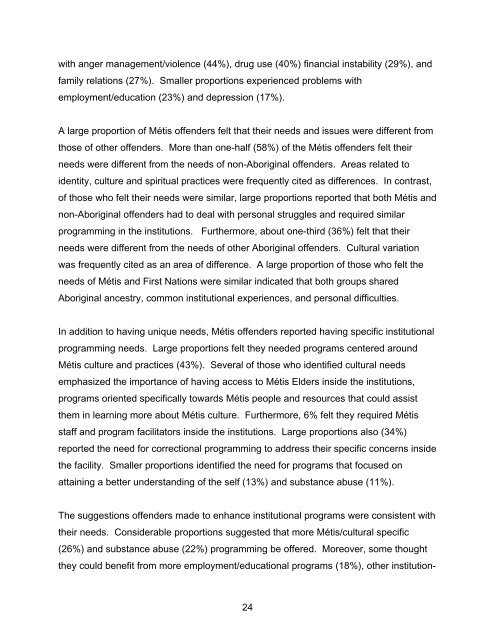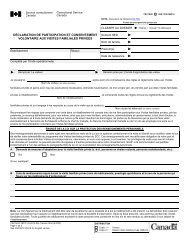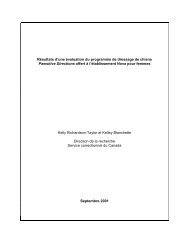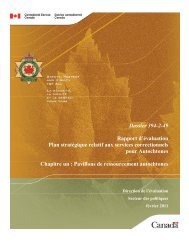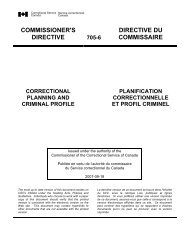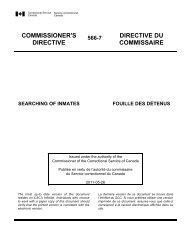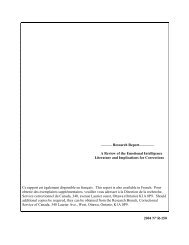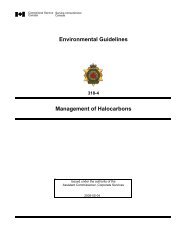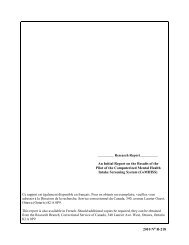Program and Service Needs of Federally Incarcerated Métis ...
Program and Service Needs of Federally Incarcerated Métis ...
Program and Service Needs of Federally Incarcerated Métis ...
You also want an ePaper? Increase the reach of your titles
YUMPU automatically turns print PDFs into web optimized ePapers that Google loves.
with anger management/violence (44%), drug use (40%) financial instability (29%), <strong>and</strong><br />
family relations (27%). Smaller proportions experienced problems with<br />
employment/education (23%) <strong>and</strong> depression (17%).<br />
A large proportion <strong>of</strong> <strong>Métis</strong> <strong>of</strong>fenders felt that their needs <strong>and</strong> issues were different from<br />
those <strong>of</strong> other <strong>of</strong>fenders. More than one-half (58%) <strong>of</strong> the <strong>Métis</strong> <strong>of</strong>fenders felt their<br />
needs were different from the needs <strong>of</strong> non-Aboriginal <strong>of</strong>fenders. Areas related to<br />
identity, culture <strong>and</strong> spiritual practices were frequently cited as differences. In contrast,<br />
<strong>of</strong> those who felt their needs were similar, large proportions reported that both <strong>Métis</strong> <strong>and</strong><br />
non-Aboriginal <strong>of</strong>fenders had to deal with personal struggles <strong>and</strong> required similar<br />
programming in the institutions. Furthermore, about one-third (36%) felt that their<br />
needs were different from the needs <strong>of</strong> other Aboriginal <strong>of</strong>fenders. Cultural variation<br />
was frequently cited as an area <strong>of</strong> difference. A large proportion <strong>of</strong> those who felt the<br />
needs <strong>of</strong> <strong>Métis</strong> <strong>and</strong> First Nations were similar indicated that both groups shared<br />
Aboriginal ancestry, common institutional experiences, <strong>and</strong> personal difficulties.<br />
In addition to having unique needs, <strong>Métis</strong> <strong>of</strong>fenders reported having specific institutional<br />
programming needs. Large proportions felt they needed programs centered around<br />
<strong>Métis</strong> culture <strong>and</strong> practices (43%). Several <strong>of</strong> those who identified cultural needs<br />
emphasized the importance <strong>of</strong> having access to <strong>Métis</strong> Elders inside the institutions,<br />
programs oriented specifically towards <strong>Métis</strong> people <strong>and</strong> resources that could assist<br />
them in learning more about <strong>Métis</strong> culture. Furthermore, 6% felt they required <strong>Métis</strong><br />
staff <strong>and</strong> program facilitators inside the institutions. Large proportions also (34%)<br />
reported the need for correctional programming to address their specific concerns inside<br />
the facility. Smaller proportions identified the need for programs that focused on<br />
attaining a better underst<strong>and</strong>ing <strong>of</strong> the self (13%) <strong>and</strong> substance abuse (11%).<br />
The suggestions <strong>of</strong>fenders made to enhance institutional programs were consistent with<br />
their needs. Considerable proportions suggested that more <strong>Métis</strong>/cultural specific<br />
(26%) <strong>and</strong> substance abuse (22%) programming be <strong>of</strong>fered. Moreover, some thought<br />
they could benefit from more employment/educational programs (18%), other institution-<br />
24


